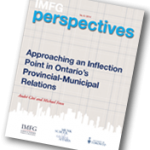The Government of Ontario’s arrangements with local governments are facing pressures for reform, and the Province’s challenging fiscal conditions could be the catalyst for a rethink about how provincial-municipal affairs are managed in the years ahead.
 This is the conclusion of a new paper by André Côté and Michael Fenn. Provincial-municipal relations receive little attention but have big impacts on public services – from transit and infrastructure to policing and social services – and far reaching implications for the prosperity and quality of life of Ontario’s communities.
This is the conclusion of a new paper by André Côté and Michael Fenn. Provincial-municipal relations receive little attention but have big impacts on public services – from transit and infrastructure to policing and social services – and far reaching implications for the prosperity and quality of life of Ontario’s communities.
Today, provincial-municipal arrangements are under pressure to adapt, in order to:
- create the conditions for Ontario’s cities and city-regions to succeed in the global economy;
- realign and integrate a complex web of services for citizens; and
- ensure the sustainability of local finances.
As in the past, the Province’s challenging finances could be the catalyst for change.
The authors outline a series of implications for policymakers, including the need to treat cities differently than small municipalities, improve regional governance, better integrate provincial and municipal services, and increase flexibility in local finances through access to new taxes.
“Approaching an Inflection Point in Ontario’s Provincial-Municipal Relations” is the sixth in the IMFG’s Perspectives series – a brief, accessible style of paper intended to help inform and spark public debate about important current issues in urban public affairs.
It accompanies the full-length IMFG Paper that can be found here:
André Côté and Michael Fenn have also written an article in Curb Magazine (Vol. 5, issue 2, 2014), published by the University of Alberta, called “Changes Imminent in Ontario’s Provincial-Municipal Relations.”
